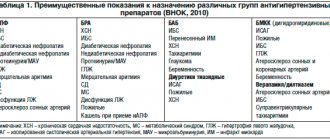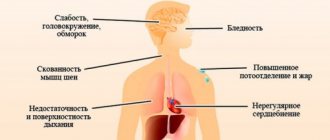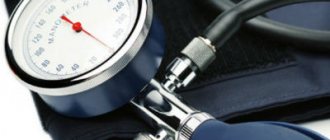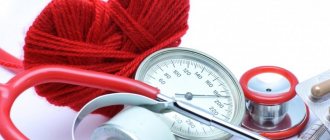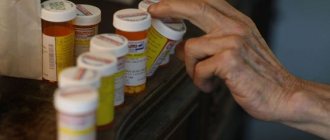Hypertension in men.
“Knowing the disease is already half the disease. M. Mudrov"
Blood pressure (blood pressure) reflects the degree and nature of a person’s activity, his attitude towards various events, positive and negative.
Arterial hypertension
in men it is most often a certain reaction to such events in life. Men develop arterial hypertension 10-15 years earlier than women. As a rule, they experience internal tension and resistance for a long time, generated by all kinds of fears, mistrust, and reluctance to accept this or that situation. They are under pressure from troubles that they cannot cope with at the moment.
Causes
The reasons for the development of arterial hypertension can also be heredity, increased body weight, sedentary lifestyle, alcohol, consumption of large amounts of salt in food, unbalanced diet, and smoking. As I.P. said Pavlov: “Don’t drink wine, don’t sadden your heart with tobacco - you will live as long as Titian lived.”
Why is it necessary to treat arterial hypertension?
This “silent killer” sometimes leads to severe complications such as strokes and heart attacks. Fortunately, today hypertension is not a death sentence; it can and should be treated, but the main thing is not to try to pretend that this problem does not exist.
In order to choose the right therapy and protect yourself from such dangerous complications, you need to consult a therapist or cardiologist in time, get qualified advice, and undergo the necessary laboratory and instrumental examinations to clarify the extent and stage of the disease. Currently, various modern methods of therapy and diagnosis are used to treat hypertension. This includes ABPM for blood pressure control, the use of sartans, calcium inhibitors, cardioselective B-blockers, and metabolic drugs.
As a preventative measure, don’t forget about a healthy lifestyle, walking, playing sports and fitness, and swimming. Sanatorium-resort treatment also helps perfectly to recover after therapy.
The main thing is not to miss the problem
, and contact a specialist (general practitioner or cardiologist) as early as possible and begin treatment for arterial hypertension in the initial stages. Then in the future you will not have to deal with more serious illnesses. The Family Doctor clinic provides a quick but complete examination sufficient to make a diagnosis and prescribe effective therapy. Treatment is selected individually; make an appointment with a general practitioner or cardiologist by calling the contact center, use the online appointment service, or contact the clinic reception.
Arterial hypertension: answers to your questions
— Is it possible to define arterial hypertension?
- Currently, no. In practice, blood pressure (BP) exceeds 139/89 mmHg. Art. for six hours a day is an absolute basis for the diagnosis of “arterial hypertension.” However, I note that over 40 percent of heart attacks and strokes occur in people with lower blood pressure levels. In addition, the variability of numbers, that is, fluctuations in blood pressure during the day, is of extreme importance. Not lowering blood pressure at night is sometimes more important than absolute numbers. On the other hand, can a condition that is characteristic of 20% of people under the age of 40 and increasing blood pressure figures by 10% every decade until the age of 60-70 be considered a disease? After 70 years, the number of hypertensive patients begins to decline; people with an ideal blood pressure level of 110/70 mm Hg live to be 100 years old. Art. In the 21st century, arterial hypertension is not considered a characteristic of aging. In the overwhelming majority of healthy “normotonic” people, blood pressure increases slightly until the age of 50. Then the lower, diastolic pressure begins to decrease slightly, and the upper, systolic pressure, can gradually increase. An increase in each of these indicators, or a difference between diastolic and systolic (pulse) pressure, or a change in two or three indicators at the same time is considered hypertension.
— Is arterial hypertension an asymptomatic disease?
- Yes. In a significant number of hypertensive patients, an increase in blood pressure does not cause a change in well-being. Headache is more often the fate of hypotensive patients. Clinical signs of arterial hypertension, unfortunately, are a manifestation of complications: crisis, damage to the blood vessels of the kidneys, brain, heart.
— How high is the prevalence of high blood pressure in families?
—High blood pressure is very common in some families, and many people have first-degree relatives with hypertension. However, in such cases, the cause of arterial hypertension is not always a family predisposition. Only in a small number of cases is the cause of high blood pressure inherited, and scientists have identified a combination of many genes “culprit” for this. But in most cases, heredity is unlikely to be responsible for the occurrence of arterial hypertension.
— Is it necessary to control blood pressure in children?
—High blood pressure is common among adults, and measuring blood pressure in all children is not recommended. However, in families in which there are rare forms of arterial hypertension, and in families where arterial hypertension has previously been identified in children and adolescents, it makes sense to monitor the children's blood pressure. It should be noted that in girls taking oral contraceptives, blood pressure should be monitored regularly.
— What is white coat hypertension?
- This term refers to a situation when a person’s blood pressure increases during a visit to the doctor, but in everyday life the blood pressure is within the normal range. Typically, hypertension is diagnosed during a clinic visit, and then blood pressure is assessed over the next 24 hours at home (called ambulatory blood pressure monitoring). Unfortunately, white coat hypertension is a common precursor to arterial hypertension. It is important to realize that everyone's blood pressure is slightly lower when measured at home, even in patients with hypertension, and that this should be taken into account.
— Can lifestyle changes lead to lower blood pressure?
- Undoubtedly, lifestyle changes lead to lower blood pressure, for example, weight loss, reducing salt intake or alcohol intake. However, the results of applying the above methods are relatively modest. However, the combination, the sum of these changes can be very significant. Quitting smoking and increasing fruit consumption (at least 5 servings of greens, berries, fruits and vegetables per day), as well as increasing physical activity will help normalize blood pressure.
- Should I avoid exercise and stress?
— There is no exact data indicating that reducing stressful situations leads to a decrease in blood pressure. A little exercise is good for everyone, but you shouldn't do strenuous exercise without first talking to your doctor and checking your blood pressure.
— Is it possible to work if your blood pressure is high?
- In most cases, the answer is yes. In very rare cases, it is recommended to rest at home, for example, pregnant women, and sometimes even hospitalization is indicated. There are some professions where you will not be allowed to go to work until your blood pressure normalizes (for example, airline pilots). However, in most cases, arterial hypertension does not require refusal to work.
— Is it possible to get pregnant if I have high blood pressure?
— In almost all cases, the answer is yes. You may need to change your treatment regimen before you become pregnant, as some medications should not be used during pregnancy, and your doctor may advise you to see a hypertension specialist. In some cases, it is reasonable to achieve blood pressure control before pregnancy.
— Is it possible to cure arterial hypertension?
— In the vast majority of cases, hypertension cannot be cured and long-term therapy is required throughout life. The goal of treatment is to lower blood pressure and therefore reduce the risk associated with hypertension. Stopping treatment leads to a rapid increase in blood pressure.
— Are there advantages to various medications for the treatment of arterial hypertension?
— Currently, there are seven main groups of drugs for lowering blood pressure. In terms of the intensity of the long-term effect on blood pressure levels, none of them has advantages. When choosing a medicine, combination and dosage schedule, the doctor is guided by the following principles:
prevent dose-dependent side effects;
with high numbers or stability of blood pressure, the choice, as a rule, is a combination of two, three, or even more drugs rather than increasing the dose;
taking into account individual circumstances (gender, age, profession, etc.) and concomitant conditions (pregnancy, combination of arterial hypertension with diabetes mellitus, obesity, atherosclerotic vascular disease, heart failure, etc.).
— Do medications cause side effects?
— There are no medications that do not have side effects. Most modern drugs are well tolerated by patients, and only a small number of patients experience problems. Sometimes the side effects are quite severe, and in such cases a change in treatment is necessary. As with any treatment, it is important to evaluate the expected success of treatment and the risks associated with prescribing a particular drug. All medications are currently accompanied by detailed instructions, which indicate all side effects, even those that occur in extremely rare cases.
— Do herbal medicines reduce blood pressure?
— There is no evidence obtained in placebo-controlled studies indicating that herbal medicine lowers blood pressure and reduces the risk of strokes and myocardial infarction. However, antioxidants and fish oil may slightly lower blood pressure and may therefore be beneficial. However, they cannot replace a healthy diet rich in fish, fruits and vegetables.
— What is the goal of treating arterial hypertension?
— Of course, an achievable goal is to reduce the risk of developing its complications: heart weakness, atherosclerotic vascular damage. The way to achieve this is to establish effective control over blood pressure levels and achieve “target values”.
— What is the effectiveness of treatment for arterial hypertension?
— The answer is the result of a study conducted in a number of regions of Russia in recent years - the fulfillment of two conditions: the availability of medicines and the establishment of trusting contact with a doctor who guarantees adherence to treatment and changes in lifestyle, allowed 93% of people included in the project to achieve the target within a year blood pressure level.
article from the site https://cmphmao.ru/node/1845
How to recognize hypertension, and why is it dangerous?
Most people with high blood pressure may not even be aware of it - their health does not worsen, they do not observe any alarming symptoms. And this is the insidiousness of hypertension
, which, because of its invisibility, is called the “silent killer”. The disease may not manifest itself for years and then suddenly lead to vascular disasters: stroke, coronary heart disease (angina), myocardial infarction, heart and kidney failure, etc. Here are just some of the “target” organs that are affected by hypertension: HEART - angina pectoris, myocardial infarction, heart failure; BRAIN - cerebrovascular accident, stroke; KIDNEYS - renal failure; EYES - hemorrhages in the fundus, swelling and atrophy of the optic nerve.
How to recognize hypertension?
The only reliable way to recognize hypertension is to measure your blood pressure
!
However, there are some indirect signs that can warn a person that he is at risk of developing hypertension, and they need to pay especially close attention if they are repeated frequently and regularly: • headache, dizziness; • “floaters” before the eyes; • nausea, vomiting; • palpitations, pain in the heart area, shortness of breath. It is important to know that in the early stages of hypertension these signs may not be observed - that is why it is so dangerous. And therefore, in order to avoid the development of hypertension, it is necessary to regularly measure blood pressure - even in the absence of complaints
and in good health.
To avoid the development of hypertension, it is necessary to regularly measure blood pressure. The only reliable way to recognize hypertension is to measure your blood pressure! It is necessary to provide a balanced diet
that meets the physiological needs of the body
Seven Real Causes of High Blood Pressure
Why, in fact, every second of us becomes hypertensive, experts say
Photo: Anastasia OSIPOVA
Blood pressure greater than 130/90 units is considered elevated. This condition is called arterial hypertension (AH). Moreover, in every tenth case, high blood pressure is a symptom of some other disease - conditions accompanied by pressure surges of about 70. Such hypertension is called symptomatic. So, your blood pressure rises above 130/80 units. Possible options:
1. Violation of vascular tone
The first step is to do research: a general blood test, a biochemical blood test, a general urinalysis, an ECG (cardiogram), if necessary, a chest X-ray, an ultrasound of the internal organs.
If, based on the results of tests and examination by a cardiologist, problems with blood vessels have been identified (impaired vascular tone of the hypertensive type), and otherwise you are a completely healthy person, then your problem is called “simple” hypertension. In this case, the main tasks are: undergo all the necessary cardiovascular examinations and correctly select a regimen of antihypertensive drugs to keep the pressure within the normal range.
2. Kidney problems
Blood pressure almost always increases with kidney disease. For example, if you have urinary disorders - pain, burning, frequent urge - it is likely that you have advanced inflammation in the pelvic organs or urolithiasis. In older men, increased blood pressure can worsen prostatitis.
3. Hormonal disorders
If the blood test shows a low potassium content, and high blood pressure is combined with muscle weakness, most likely it is a deficiency of the hormone aldosterone in the body, explains cardiologist Tamara Ogieva.
The pressure rises in attacks, the crisis is accompanied by pallor, sweating, increased heartbeat, trembling, is there weight loss, upset stool? Possible pheochromocytoma - a benign tumor of the adrenal glands.
4. Hangover
Increased blood pressure is one of the common symptoms of a hangover in completely healthy people. The breakdown of alcohol causes spasms of blood vessels in the brain, which gives rise to hypertensive symptoms. In this case, it is possible to take an antispasmodic (spazgan, spasmalgon, baralgin), which will relax the blood vessels and at the same time relieve pain.
5 Popular drugs
It turns out that taking popular painkillers can cause not only stomach problems (they irritate the mucous membrane - it’s no longer a secret), but also a hypertensive crisis. Especially if you suffer from high blood pressure. Scientists from Tel Aviv University have concluded that painkillers may be the cause of hypertension, which is known to increase the risk of strokes and heart attacks.
There are painkillers, the side effect of which is an increase in blood pressure (this is honestly written in the instructions, but who reads it when you urgently need to relieve pain). Cardiologist Tamara Ogieva says that these include medications with paracetamol and caffeine. By the way, they can weaken the effect of antihypertensive drugs (that is, medications that are prescribed to hypertensive patients for blood pressure). So be careful.
6. Some products
It turns out that blood pressure can suddenly jump after a hearty lunch. Especially if you've eaten too much salty food. Salt is known to retain fluid in the body, which invariably leads to increased stress on the blood vessels.
Moreover, in addition to herring and sauerkraut, the culprits of “food” hypertension may be products with so-called hidden salt - raw smoked sausages, salted cheeses such as suluguni or aged cheeses such as parmesan, red caviar. Coffee and energy drinks, fortified wines, vermouths, and beer also increase blood pressure. Drinks with a sour taste are reduced - fruit drinks, tea with lemon, a glass of light dry wine.
7. Sore back
Do not be surprised if the cardiologist, if you complain of heaviness in the back of the head and high blood pressure, sends you for an x-ray of the cervical spine. Osteochondrosis or the consequences of untreated back injuries often lead to hypertension, says orthopedist Sergei Goryachev. The reason is that due to damage to the vertebrae, constant tension is created in the muscles of the back and neck. And this can cause spasms in the blood vessels of the neck and disruption of brain nutrition.
By the way, an increase in pressure in the evening is often associated with an improperly equipped workplace, when you also have to greatly strain the eye muscles.
IMPORTANT!
Additional examination is always needed if:
- hypertension suddenly appeared after 60 years of age,
- the pressure increased suddenly and immediately to high numbers,
- Drug treatment does not help.
CHECK YOURSELF
Blood pressure standards developed by WHO:
Reduced normal - 115-110/70 mm Hg. Art.
Optimal - 120/80 mmHg. Art.
The upper limit of normal is 130-139/85 mm Hg. Art.
Arterial hypertension - from 140/90 mm Hg. Art. and higher.
ON A NOTE
10 reasons why you are at risk of hypertension
The sad truth of life is that more and more often people who have just reached their fourth decade are forced to take blood pressure medications. And there are many who are long overdue for a prescription, but people are not even aware of their incipient health problems. It just doesn’t occur to many people that, for example, hypertension can strike at such a young age. Meanwhile, almost all of us are faced with factors that increase the likelihood of developing high blood pressure. Here are just the most common of them (details).
5 unexpected reasons for high blood pressure
40 million people in Russia are hypertensive. According to official estimates, every third resident of our country over 30 years of age periodically suffers from attacks of high blood pressure. Experts explain why, in addition to cardiovascular diseases, the tonometer numbers go off scale (details).
How to lower blood pressure without medications
If your doctor has diagnosed you with hypertension and prescribed appropriate treatment, you can try to lower your blood pressure naturally. Here are seven simple and reliable ways (details).
Which drinks raise and which lower blood pressure?
Experts told us what is healthier to drink for hypertensive patients and what for hypotensive patients (details).
BY THE WAY
Cats reduce blood pressure
Stroking a cat's fur is believed to lower blood pressure. Mysticism aside, there is a scientific explanation for this (details).
What causes hypertension?
The cause of a stable increase in blood pressure can be various factors: Excess weight
.
Blood pressure increases with increasing body weight. Each extra kilogram adds an average of 1–2 mmHg. Excess fat deposits in the chest and abdomen are especially important. Salty and fatty foods
.
Excessive consumption of fatty and especially salty foods increases blood pressure. It is known that hypertensive people, as a rule, consume 3 times more salt than people with normal blood pressure. Smoking
.
When smoking, blood vessels are known to narrow - this leads to an increase in pressure, sometimes by 10-30 mmHg. even from one single cigarette. Lack of physical activity
.
Individuals who are sedentary or unexercised have a 20 to 50 percent higher risk of developing hypertension compared to those who are active. Psychosocial factors
.
Various types of stress increase blood pressure. This factor is of particular importance for city residents. Heredity
.
Heredity is one of the most powerful risk factors for developing hypertension. Diabetes
.
Another powerful risk factor for developing hypertension is the presence of diabetes. Age
. With age, the risk of developing and developing hypertension increases.
